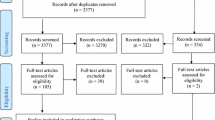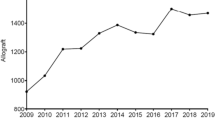Abstract
Purpose
The use of bone and connective tissue allografts has grown rapidly and surpassed the use of autografts in many countries. Being of human origin, bone and tendon allografts carry the risk of disease transmission and complications have been reported. As part of the Project NOTIFY led by the World Health Organisation, an effort to improve recognition, reporting, tracking and investigation of adverse outcomes of allografts was initiated, achieving a comprehensive review of associated disease transmission and failures. Those involving the use of musculoskeletal allografts are reported here. A major objective is to involve orthopaedic surgeons in the improvement of the safe use of the musculoskeletal allografts.
Methods
We reviewed the medical literature, requested reports from surgeons in selected professional organisations and informally surveyed tissue bank organisations and selected tissue bank professionals to discover reported and unreported cases of adverse outcomes. We analysed each case to decide the likelihood that the complication was truly allograft related.
Results
The efficiency of the procedures involved in bone banking and bone and tendon allograft has improved significantly during the last three decades. The evolution of the incidence of reported adverse reactions and events reflects positively on the safety of transplanted tissues. Cases of bacterial and viral transmission by bone and tendon allografts occurred mainly with those that contained viable cells, were not processed to remove cells, or were not disinfected or sterilised. We documented cases of transmission of human immunodeficiency virus (HIV), hepatitis C virus (HCV), human T-lymphotropic virus (HTLV), unspecified hepatitis, tuberculosis and other bacteria. Reporting of these adverse outcomes has led to corrective actions and has significantly improved the safety of allograft use. However, it is probable that not all cases have been reported and investigated.
Conclusions
Considering the high quality standards achieved in many countries, the best approach for further improvement in the safety of allografts is through a systematic reporting of all serious adverse reactions and events in the context of a global biovigilance programme.
Similar content being viewed by others
References
Aho A, Hirn M, Aro HT et al (1998) Bone bank service in Finland. Experience of bacteriologic, serologic and clinical results of the Turku Bone Bank 1972–1995. Acta Orthop Scand 69(6):559–565
Anderson M, Keyak J, Skinner H (1992) Compressive mechanical properties of human cancellous bone after gamma irradiation. J Bone Joint Surg Am 74:747–752
Brantigan J, Cunningham B, Warden K, McAfee P, Steffee A (1993) Compression strength of donor bone for posterior lumbar interbody fusion. Spine 18:1213–1221
Burchardt H (1981) Biology of cortical bone graft incorporation. In: Friedlander G, Mankin H, Sell K (eds) Osteochonral allograft. Little and Brown, New York
Cartwright E, Prabhu R, Zinderman CE et al (2010) Transmission of Elizabethkingia meningoseptica (formerly Chryseobacterium meningosepticum) to tissue-allograft recipients: a report of two cases. J Bone Joint Surg Am 92(6):1501–1506
Conrad E, Gretch D, Obermeyer K et al (1995) Transmission of the hepatitis-C virus by tissue transplantation. J Bone Joint Surg Am 77:214–224
Currey J, Foreman J, Laketić I, Mitchell J, Pegg D, Reilly G (1997) Effects of ionizing radiation on the mechanical properties of human bone. J Orthop Res 15:111–117
Doerr H, Cinatl J, Stürmer M, Rabenau H (2003) Prions and orthopedic surgery. Infection 31(3):163–171
Duffy P, Wolf J, Collins G, DeVoe AG, Streeten B, Cowen D (1974) Possible person-to-person transmission of Creutzfeldt-Jakob disease. N Engl J Med 290:692–693
Eastlund T, Strong DM (2003) Infectious disease transmission through tissue transplantation. In: Phillips GO (ed) Advances in tissue banking, vol 7. World Scientific, Singapore, pp 51–131
Eastlund T (2006) Bacterial infection transmitted by human tissue allograft transplantation. Cell Tissue Bank 7:147–66
Eggen B, Nordbø S (1992) Transmission of HCV by organ transplantation. N Engl J Med 326:411
Friedlaender GE (1983) Immune responses to osteochondral allografts. Current knowledge and future directions. Clin Orthop Relat Res 174:58–68
Friedlaender G, Strong D, Tomford W, Mankin H (1999) Long-term follow-up of patients with osteochondral allografts. A correlation between immunologic responses and clinical outcome. Orthop Clin North Am 30:583–588
Galea G, Kearney J (2005) Clinical effectiveness of processed and unprocessed bone. Transfus Med 15:165–174
Geesink R, Hoefnagels N, Bulstra S (1999) Osteogenic activity of OP-1 bone morphogenetic protein (BMP-7) in a human fibular defect. J Bone Joint Surg Br 81:710–718
Grossi P, Strong DM (2009) Donor testing and donation testing. In: Warwick R, Fehily D, Brubaker S, Eastlund T (eds) Tissue and cell donation: an essential guide. Wiley-Blackwell, Oxford, pp 116–133
Hamer A, Strachan J, Black M, Ibbotson C, Stockley I, Elson R (1996) Biomechanical properties of cortical allograft bone using a new method of bone strength measurement. A comparison of fresh, fresh-frozen and irradiated bone. J Bone Joint Surg Br 78:363–368
Heckmann JG, Lang CJ, Petruch F, Druschky A, Erb C, Brown P et al (1997) Transmission of Creutzfeldt-Jakob disease via a corneal transplant. J Neurol Neurosurg Psychiatry 63:388–390
Israel D, Nove J, Kerns KM et al (1996) Heterodimeric bone morphogenetic proteins show enhanced activity in vitro and in vivo. Growth Factors 13(3–4):291–230
Jackson D, Windler G, Simon TM (1990) Intraarticular reaction associated with the use of freeze-dried, ethylene oxide-sterilized bone-patella tendon-bone allografts in the reconstruction of the anterior cruciate ligament. Am J Sports Med 18(1):1–10, discussion 10–11
James J (1953) Tuberculosis transmitted by banked bone. J Bone Joint Surg Br 35-B:578
James L, Ibrahim T, Esler C (2004) Microbiological culture results for the femoral head. Are they important to the donor? J Bone Joint Surg Br 86(6):797–800
Kainer M, Linden J, Whaley DN et al (2004) Clostridium infections associated with musculoskeletal-tissue allografts. N Engl J Med 350(25):2564–2571
Kang J, Kim N (1995) The biomechanical properties of deep freezing and freeze drying bones and their biomechanical changes after in-vivo allograft. Yonsei Med J 36:332–335
Karcher H (1997) HIV transmitted by bone graft. BMJ 314:1300
Khanna SK, Ross JK, Monro JL (1981) Homograft aortic vale replacement: seven years’ experience with antibiotic-treated valves. Thorax 36:330–337
Lane K, Brown P, Howell DN et al (1994) Creutzfeldt-Jakob disease in a pregnant woman with an implanted dura mater graft. Neurosurgery 34(4):737–739, discussion 739–740
Lang C, Schüler P, Engelhardt A et al (1995) Probable Creutzfeldt-Jakob disease after a cadaveric dural graft. Eur J Epidemiol 11(1):79–81
Lee E, Ferguson D, Jernigan D et al (2007) Invasive group-A streptococcal infection in an allograft recipient. A case report. J Bone Joint Surg Am 89(9):2044–2047
Lesinski S (1977) Availability of homograft otologic tissue. Otolaryngol Clin North Am 10(3):613–616
Li C, Ho Y, Liu Y (2001) Transmission of human immunodeficiency virus through bone transplantation: a case report. J Formos Med Assoc 100(5):350–351
Mallick T, Mosquera A, Zinderman C, St Martin L, Wise R (2010) Reported infections after human tissue transplantation before and after new food and drug administration (FDA) regulations, United States, 2001 through June, 2010. Cell Tissue Bank 2011 Apr 9 [Epub ahead of print]
Masullo C, Pocchiari M, Macchi G et al (1989) Transmission of Creutzfeldt-Jakob disease by dural cadaveric graft. J Neurosurg 71(6):954–955
Centers for Disease Control (CDC) (1988) Transmission of HIV through bone transplantation: case report and public health recommendations. MMWR Morb Mortal Wkly Rep 37:597–599
Nather A, Thambyah A, Goh J (2004) Biomechanical strength of deep-frozen versus lyophilized large cortical allografts. Clin Biomech (Bristol, Avon) 19:526–533
Palmer S, Gibbons C, Athanasou NA (1999) The pathology of bone allograft. J Bone Joint Surg Br 81(2):333–335
Pelker RR, Friedlander GE, Markham TC (1983) Biomechanical properties of bone allografts. Clin Orthop Relat Res 174:54–57
Pereira B, Milford E, Kirkman R et al (1993) Low risk of liver disease after tissue transplantation from donors with HCV. Lancet 341:903–904
Poitout D, Novakovitch G (1987) Utilisation des allogreffes en oncologie et en traumatologie. Int Orthop 11:169–178
Pruss A, Caspari G, Krüger DH et al (2010) Tissue donation and virus safety: more nucleic acid amplification testing is needed. Transpl Infect Dis 12:375–386
Rasmussen TJ, Feder SM, Butler DL, Noyes FR (1994) The effects of 4 Mrad of gamma irradiation on the initial mechanical properties of bone-patellar tendon-bone grafts. Arthroscopy 10:188–197
Sanzén L, Carlsson A (1997) Transmission of human T-cell lymphotrophic virus type 1 by a deep-frozen bone allograft. Acta Orthop Scand 68(1):72–74
Schratt H, Regel G, Kiesewetter B et al (1996) HIV infection caused by cold preserved bone transplants. Unfallchirurg 99(9):679–684
Shutkin NM (1954) Homologous-serum hepatitis following the use of refrigerated bone-bank bone. J Bone Joint Surg Am 36-A(1):160–162
Simonds RJ, Holmberg SD, Hurwitz RL et al (1992) Transmission of human immunodeficiency virus type 1 from a seronegative organ and tissue donor. N Engl J Med 326(11):726–732
Simonian P, Conrad E, Chapman J, Harrington R, Chansky H (1994) Effect of sterilization and storage treatments on screw pullout strength in human allograft bone. Clin Orthop Relat Res 302:290–296
Strong DM, Friedlaender GE, Tomford WW et al (1996) Immunologic responses in human recipients of osseous and osteochondral allografts. Clin Orthop Relat Res 326:107–114
Strong DM (2005) Effects of radiation on the integrity and functionality of soft tissue. Current situation: tendons, vessels, heart valves, etc. Changes with increasing dose/dose limits. In: Kennedy JF, Phillips GO, Williams PA (eds) Sterilization of tissues using ionizing radiations. Woodland, Cambridge, pp 163–172
Strong DM, Shinozaki N (2010) Coding and traceability for cells, tissues and organs for transplantation. Cell Tissue Bank 11:305–323
Thorén K, Aspenberg P (1995) Ethylene oxide sterilization impairs allograft incorporation in a conduction chamber. Clin Orthop Relat Res 318:259–264
Tomford WW, Ploetz JE, Mankin HJ (1986) Bone allografts of femoral heads: procurement and storage. J Bone Joint Surg Am 68(4):534–537
Tomford W, Thongphasuk J, Manking H, Feraro M (1990) Frozen musculoskeletal allografts. A study of the clinical incidence and causes of infection associated with their use. J Bone Joint Surg Am 72(8):1137–1143
Tugwell BD, Patel PR, Williams IT et al (2005) Transmission of hepatitis C virus to several organ and tissue recipients from an antibody-negative donor. Ann Intern Med 143(9):648–654
Vastel L, Masse C, Crozier E, Padilla F, Laugier P, Mitton D, Bardonnet R, Courpied JP (2007) Effects of gamma irradiation on mechanical properties of defatted trabecular bone allografts assessed by speed-of-sound measurement. Cell Tissue Bank 8:205–210
Wenz B, Oesch B, Horst M (2001) Analysis of the risk of transmitting bovine spongiform encephalopathy through bone grafts derived from bovine bone. Biomaterials 22:1599–1606
World Health Organization (WHO) and Centro Nazionale Trapianti (CNT): Report of the Global Consultation for the Project NOTIFY-Exploring Vigilance Notification for Organs Tissues and Cells. Bologna 7–9 April 2011
World Health Organization (WHO) and Centro Nazionale Trapianti (CNT): Report of the First Global Consultative Meeting on the Bologna Initiative for Global Vigilance and Surveillance. Geneva 5–6 July 2011 in press
Zhang Y, Homsi D, Gates K, Oakes K, Sutherland V, Wolfinbarger L (1994) A comprehensive study of physical parameters, biomechanical properties, and statistical correlations of iliac crest bone wedges used in spinal fusion surgery. IV. Effect of gamma irradiation on mechanical and material properties. Spine 19:304–308
Zwitser E, de Gast A, Basie MJA et al (2009) B-cell lymphoma in retrieved femoral heads: a long term follow up. BMC Musculoskelet Disord 10:53–57
Author information
Authors and Affiliations
Corresponding author
Rights and permissions
About this article
Cite this article
Hinsenkamp, M., Muylle, L., Eastlund, T. et al. Adverse reactions and events related to musculoskeletal allografts: reviewed by the World Health Organisation Project NOTIFY. International Orthopaedics (SICOT) 36, 633–641 (2012). https://doi.org/10.1007/s00264-011-1391-7
Received:
Accepted:
Published:
Issue Date:
DOI: https://doi.org/10.1007/s00264-011-1391-7




